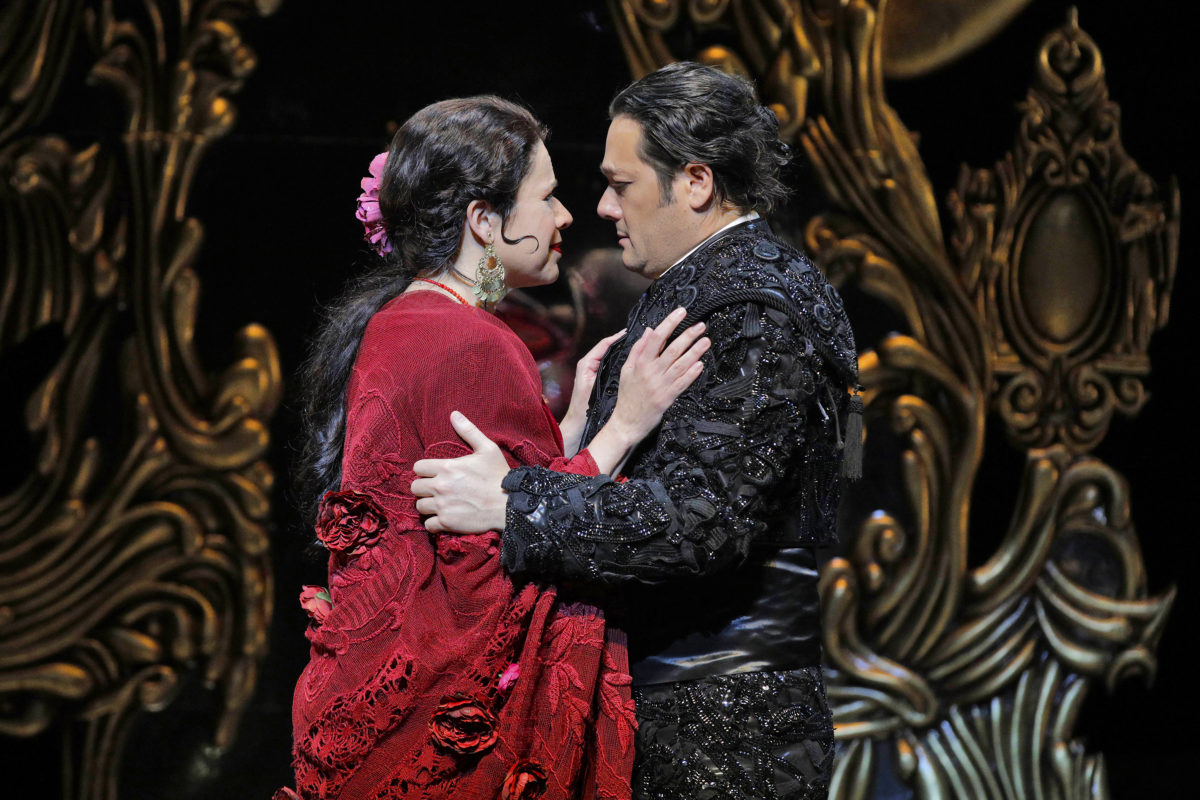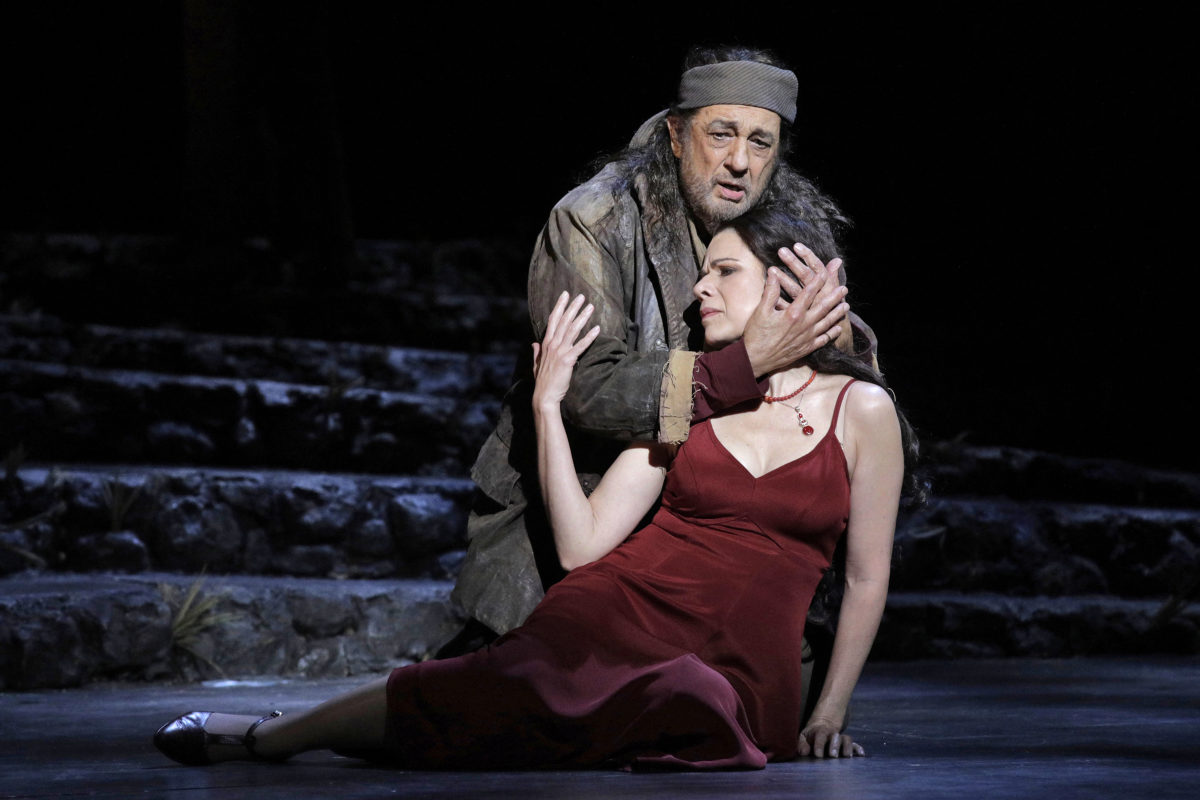LA Opera’s “El Gato Montés: The Wildcat”

Nancy Fabiola Herrera as the fortune teller and Arturo Chacón-Cruz as Rafael. Photo by Cory Weaver
“El Gato Montés: The Wildcat” (a review)
Spain is known for many things, from sangria to Segovia, but not for its operas. Oh, but what about “Carmen”? “Carmen,” my friend, is French. There is, however, the zarzuela, which is closer to an old Spanish version of musical theater, largely because it often has both singing and speaking parts.
LA Opera patrons know that when Plácido Domingo was a lad in Spain, his parents ran a zarzuela company, and so the genre has always remained dear to his heart. We saw that in 1994 when the company presented “El Gato Montés,” and then again in 2007 when “Luisa Fernanda” was on the bill. Worldwide, zarzuela may be a moribund artform, but it certainly won’t stop breathing as long as Domingo is around. And so, a quarter of a century later, “El Gato Montés” is back on stage
It was composed in 1916 by Manuel Penella, who is credited with both the music and the libretto, although I believe there was a librettist for the first act who then bowed out after the death of his wife. Penella has a long list of credits, but today he seems best known for the music of the pasodoble (which emulates the movements of a bullfight) which takes place in “El Gato Montés.”
LA Opera’s current production of “El Gato Montés” comes to Los Angeles courtesy of the Teatro de la Zarzuela in Madrid. Visually, it’s a dark opera, but then so is the story.
The young bullfighter Rafael Ruiz, known as “El Macareno” (or the braggart) is returning to Seville from his triumph in Madrid. Waiting for him is his mother, Frasquita (Sharmay Musacchio) and his girlfriend, Soleá (Ana María Martínez). We’re convinced that Soleá only has eyes for Rafael (Arturo Chacón-Cruz). Well, we’re soon to learn otherwise, but meanwhile…
A full chorus steps out to welcome the lad: “All hail the great matador!”

Ana María Martínez as Soleá and Arturo Chacón-Cruz as Rafael. Photo by Cory Weaver
As if on cue, Juanillo, the Wildcat himself (Plácido Domingo) arrives with his rifle-toting bandits. Resembling a crusty old buccaneer (we half-expect to see a pirate ship in the distance), Juanillo is both an outlaw and a party crasher. Years ago he killed a man (apparently someone who insulted Soleá) and he’s been on the run ever since.
I think that many of us are surprised when Soleá says, “I know Juanillo is lost to me, but I cannot bring myself to love Rafael.” Huh? Is this another variant of the preppy young lass preferring the town’s bad boy over the clean-cut varsity football player?

Arturo Chacón-Cruz as Rafael. Photo by Cory Weaver
Despite his nickname, Rafael comes across as young and idealistic, a Romantic with a cape. Taunted by the Wildcat, who challenges him to kill six bulls, Rafael will go into the ring with the aim of impressing Soleá and dazzling the rest of us. If Peter Sellars ever transposed this work into a modern setting he could very well make Rafael a race car driver and Juanillo the owner of a casino.
But before all that happens, Rafael croons to Soleá, “I die of longing when I look in your dark eyes,” and they sing a touching duet now, and another (“torero quiero ser”) later. Chacón-Cruz has that bright but pained and plaintive voice that perhaps calls to mind such tenors as Rolando Villazón and Greg Fedderly. Rafael also professes his deep affection for his mother, which telegraphs that while he may be boastful he’s not unmindful of the woman who raised him.
Throughout, “El Gato Montés” is sprinkled with Spanish dance, the flamenco in particular, choreographed by Cristina Hoyes.
The music, conducted by Jordi Bernàcer, is often lush and wraps itself around the singers. This is an opera with a big heap of passion, and it sees no need to hold back.
As he prepares for what should be his crowning achievement in the ring, Rafael is anything by modest. Pride before a fall, and all that.
This pivotal scene is played out in shadow; we see flashes of a red cape, we hear the encouragement from the crowd, and although it’s all sort of veiled in mystery the momentum rises and we do get a sense of “El Gato Montés” as grand opera. But in the blink of an eye the fortune teller’s apprehensions have materialized and Rafael is being frantically wheeled back and forth across the stage on a gurney, his toreador’s outfit stained with blood.
“It was love that killed poor Rafael,” says Padre Antón, uttered with the same sense of poetic finality as at the end of “King Kong” when we hear that it wasn’t the planes, “it was beauty killed the beast.”
A day or two later, at the wake for the fallen bullfighter, Juanillo and his fellow bandits come down from their mountain hideaway, but they aren’t exactly bearing sympathy cards and flowers. Juanillo says he’s not leaving again until Soleá goes with him. The girl hesitates, but the bandit is impatient and drags her away with him.

Plácido Domingo as Juanillo, “The Wildcat,” and Ana María Martínez as Soleá. Photo by Cory Weaver
Despite having their fingers on the trigger, the bandits are overtaken. Juanillo is fired upon, but at the last moment Soleá steps in front of him and takes the bullet (how many times have we seen this in a movie or a melodrama?). In Penella’s version the bullet also kills the Wildcat, but Domingo changed the ending. After a quick lament over his deceased lover, he stabs himself and dies, thus going out with a whimper. Had this reviewer been called in for his advice, the opera would have concluded with Juanillo charging Soleá’s killers like an enraged grizzly, knocking down several of them before at last succumbing to one gunshot too many. Taking his own life? That’s not in his character.
Be that as it may, this is one of the few operas I’ve seen in a very long time where my interest didn’t flag at one point or another and head out the door. It has a very good cast, the leads plus all the minor performers, including Niru Liu as the young shepherd. Plácido Domingo was right on the money for reviving this opera one more time. And let’s hope it won’t be the last.
El Gato Montés: The Wildcat is onstage at the Dorothy Chandler Pavilion, 135 N. Grand Ave., downtown Los Angeles at the Music Center. Two more performances: Thursday, May 16 at 7:30 p.m. and Sunday, May 19, at 2 p.m. Tickets, $25 to $251. Call (213) 972-8001 or go to laopera.com. ER

